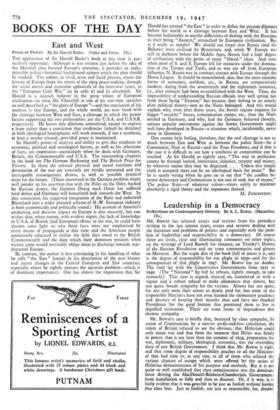BOOKS OF THE DAY
East and West
Peace or Power. By Sir Harold Butler. (Faber and Faber. 15s.) THE appearance of Sir Harold Butler's book at this time is par- ticularly opportune. Although it was written just before the idea of the Marshall plan focused Europe's attention, it provides an indis- pensable politico-historical background against which the plan shotild be studied. The author, in vivid, terse and lucid phrases, traces the history of Europe from the errors of the 1919 peace-making, through the social unrest and economic upheavals of the inter-war years, to the " European Civil War " (as he calls it) and its aftermath. Sir Harold is a staunch believer in the great values of European civilisation—in what Mr. Churchill in one of his war-time speeches so well described as " the glory of Europe "—and the conclusion of his analysis is that Europe, and the whole world, are now faced with the cleavage between West and East, a cleavage in which the power factors supporting the two philosophies are the U.S.A. and U.S.S.R. respectively. He leaves this dilemma unresolved, except to express a hope rather than a conviction that tendencies .(which he sketches) in both ideological hemispheres will work towards, if not a synthesis, at least a modus vivendi, provided peace is.maintained.
Sir Harold's power of analysis and ability to give due emphasis to economic, political and sociological factors, as well as his selections of facts, are impressive—particularly when he deals with Germany, Britain, the Commonwealth and U.S.A. The outstanding chapters in the book are The German Reckoning and The British Price for Victory. In these the colossal physical and moral exertions and devastation of the war are concisely yet vividly presented and the inescapable consequences drawn, as well as possible practical steps for the future. (Those interested in the German problem might well ponder on his assertion that with the Poles on the Oder, backed by Russian power, the German Drang each Osten has suffered total defeat and Germany will henceforth look towards the West. In this connection, his suggested integration of the Ruhr and industrial Rhineland into a wider planned scheme of N.-W. European industry is both economically and politically sound.) His account of America's awakening and decisive impact on Europe is also masterly, but one wishes that, when noting, with evident regret, the lack of knowledge in U.S.A. of British (and European) efforts in the war, he could have thrown some light on why these facts were not emphasised by every means of propaganda at this time and the American people consistently educated to realise the debt they owed to the British Commonwealth and the duty which their dominant position when victory came would inevitably oblige them to discharge towards war- shattered Europe.
By contrast, the author is less convincing in his handling of what he calls " the East " (except in his description of the past history and recent changes in the Central European and Slav countries, especially where he rightly stresses the agrarian problem—which is of dominant importance). One has almost the impression that Sir
Harold has created " the East " in order to define the presetit dilemma before the world as a cleavage between East and West It has become fashionable to ascribe difficulties of dealing with the Russians to .their being " Eastern," untouched by European civilisation. But is it really so simple? We should not forget that Russia (and the Balkans) were civilised by Byzantium, and, while W. Europe was still in darkness before the Middle Ages, Russia had a high degree of civilisation, with the germs of many " liberal " ideas. And even when most of S. and E. Europe fell for centuries under the domina- tion of the Tartars and Turks, and so was cut off from European influence, N. Russia was in constant contact with Europe through the Hansa League. It should be remembered, also, that the most extreme forms of autocracy, serfdom, etc., in. Russia, are comparatively modern, dating from the seventeenth and the eighteenth centuries, i.e., after contacts had been re-established with the West. Thus, the impossibility of understanding Russian officials may well spring not from these being " Eastern," but because they belong to an utterly alien political theory—just as the Nazis belonged. And this would explain why, even after thirty years, the Soviet regime requires far bigger " security " forces, concentration camps, etc., than the Nazis needed in Germany, and why, had the Germans behaved cleverly, serious popular movements against the Soviet Government might well have developed in Russia—a situation which, incidentally, never arose in Germany.
One cannot help feeling, therefore, that the real cleavage is not so much between East and West as between the police State—be it Communist, Nazi or Fascist—and the Four Freedoms, and if that is the case it is difficult to see how a synthesis or compromise can be reached. As Sir Harold so rightly says, "The way to .perfection cannot be through hatred, intolerance, injustice, tyranny and misery, by whatever names they may be disguised. . . . Unless this simple truth is accepted there can be no ideological basis for peace." But he is surely wrong when he goes on to say that "the conflict be- tween democracy and Communism is not one of ends but of means." The police State—of whatever colour—exists solely to maintain absolutely a rigid theory and the exponents thereof.
M. ZVEGINTZOV.


































 Previous page
Previous page